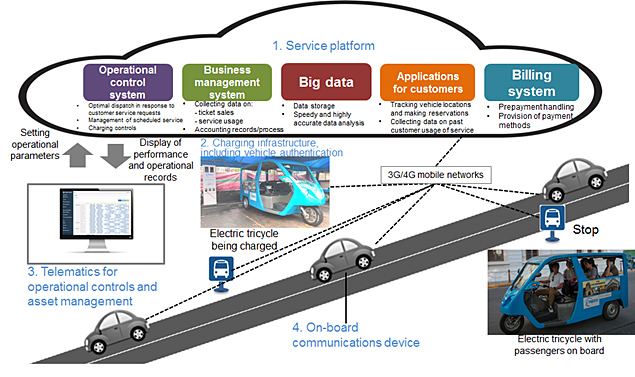Completion of Demonstration Project in the Philippines on Next-Generation Public Transportation System Using Electric Tricycles
– Energy Consumption Reduced by 85% Compared to Gasoline Vehicles –
October 30, 2018
New Energy and Industrial Technology Development Organization (NEDO)
The New Energy and Industrial Technology Development Organization (NEDO) and Softbank Corp. have completed a project to demonstrate a next-generation public transportation system that uses electric tricycles in combination with an electric vehicle (EV) ecosystem that includes charging stations and a billing system. The project realized punctual operation of scheduled services, management of on-time dispatch rate, management of EV charging, standardization of system technology, as well as a reduction of more than 85% in energy consumption compared to a system using conventional gasoline-powered tricycles.
In light of these achievements, this EV-based public transportation system will be promoted throughout the Philippines, potentially contributing to further reductions in energy consumption.

1.Overview
The Philippines seeks to alleviate environmental problems resulting from transportation, such as noise, traffic congestion, and air pollution caused by gasoline and diesel vehicle exhaust, and also has a strong interest in an energy-efficient public transportation system that can be achieved by using EV and information technologies. As gasoline-powered tricycles consisting of motorcycles and side cars are widely used in the Philippines, replacing them with electric-powered vehicles is expected to help alleviate environmental impacts. However, to promote greater use of EVs, it is necessary to not only develop EVs but also establish new EV-related infrastructure, including charging stations, IT solutions and management services for using EVs, EV maintenance systems, and a funding scheme for EV-related infrastructure.
Against this backdrop, NEDO concluded separate agreements with the Philippines' Department of Trade and Industry (DTI) and the Intramuros Administration (IA) in April 2016 to carry out a demonstration project aimed at introducing and promoting a next-generation public transportation system known as “Mobility as a System” that uses electric tricycles in combination with an EV ecosystem.
Work related to project implementation was entrusted to Softbank Corp. and carried out for almost two years from October 2016 until September 2018 in Intramuros, an area in the city of Manila that is home to many tourist attractions and educational institutions. The EV ecosystem used during the demonstration project consisted of four elements: a service platform, a charging infrastructure that included information on vehicle authentication, telematics* technology for operational control and asset management, and on-board communications devices. The ecosystem was provided as a service package to realize punctual operation of scheduled transport services, management of on-time dispatch rate, management of EV charging, and standardization of system technology. Use of the new system under the project resulted in a reduction of more than 85% in energy consumption compared to a system using conventional gasoline-powered tricycles.
On October 30, 2018, NEDO, DTI, IA, and Softbank Corp. provided a briefing in Intramuros to report on project achievements to interested parties, including representatives from the governments of Japan and the Philippines.
2.Project Achievements
- Demonstration activities were carried out to implement a next-generation public transportation system that uses electric tricycles in combination with an EV ecosystem. The effectiveness of the system and its energy conservation benefits were verified, with the following three positive outcomes. First, a function utilizing on-board IT solutions to automatically adjust the distances between vehicles was successfully introduced, resulting in punctual operation of scheduled services. Second, by using telematics technology, at least 90% of service operations were carried out on schedule. Problems such as vehicle breakdowns or dead batteries due to faulty recharging schedules were identified and rectified in a timely manner. This enabled appropriate measures to be taken for the smooth dispatch of vehicles. Third, real-time monitoring of remaining battery life and charge status allowed for continuous vehicle operations without exhausting the battery charge.
- A common obstacle to promoting the widespread use of electric tricycles has been the limited availability of charging stations. In order to overcome this obstacle, a system has been established to build and manage, through IT networks, a database of information on the vehicle charging infrastructure. The database includes information on vehicle authentication, vehicle battery charging levels, and the operational status of individual vehicles.
- A system has been established to provide passenger transport companies with packaged services for vehicle systems. Furthermore, various types of contracts can be offered to meet the varying needs of these companies.
In summary, the demonstration activities under the project realized many positive outcomes including punctual operation of scheduled transport services, on-time dispatch rate management, EV charging management, and standardization of system technology. At the project demonstration site in Intramuros, use of the new system achieved a reduction of more than 85% in energy consumption compared to a system using conventional gasoline-powered vehicles.
3. Next steps
Softbank Corp. will promote the project demonstration site as a showcase for next-generation public transportation systems in the Philippines, which can make a significant contribution to reducing gas emissions and energy consumption as well as address environmental problems related to public transportation systems, such as air pollution, noise, and traffic congestion.
*Telematics: a term created by combining the words telecommunications and informatics which describes technologies related to using computers and wireless communication devices to send and receive information over long distances.
4.For more information, please contact:
Energy Conservation Technology Department, NEDO
Contact persons: Okuno, Ueno Tel: +81-44-520-5284
International Affairs Department, NEDO
Contact persons: Kuroda Tel: +81-44-520-5190
